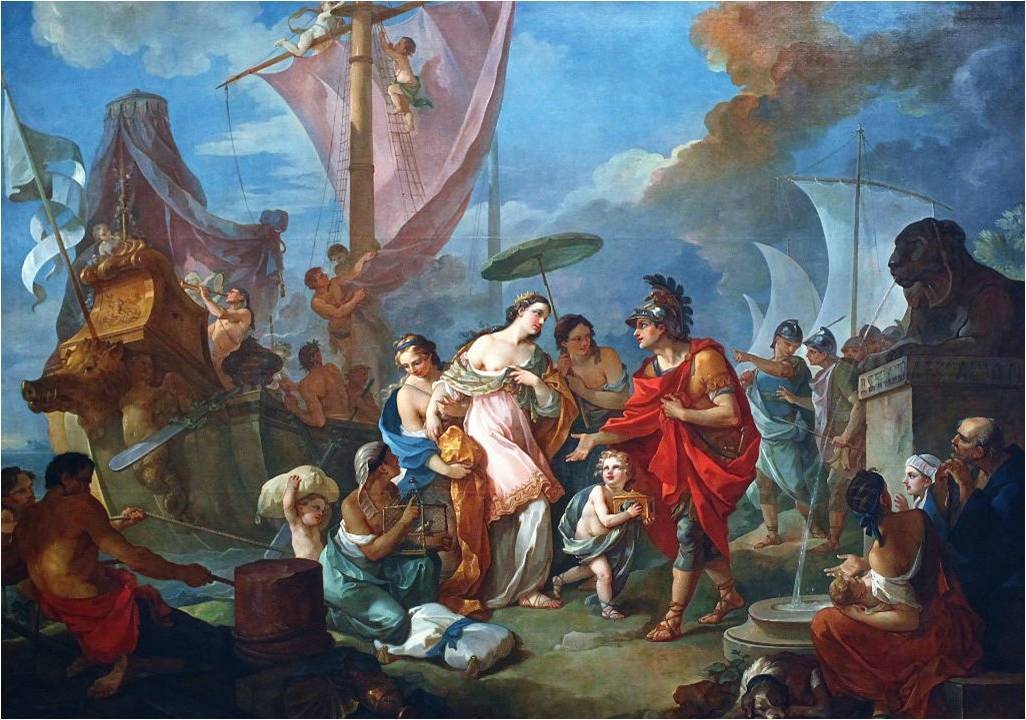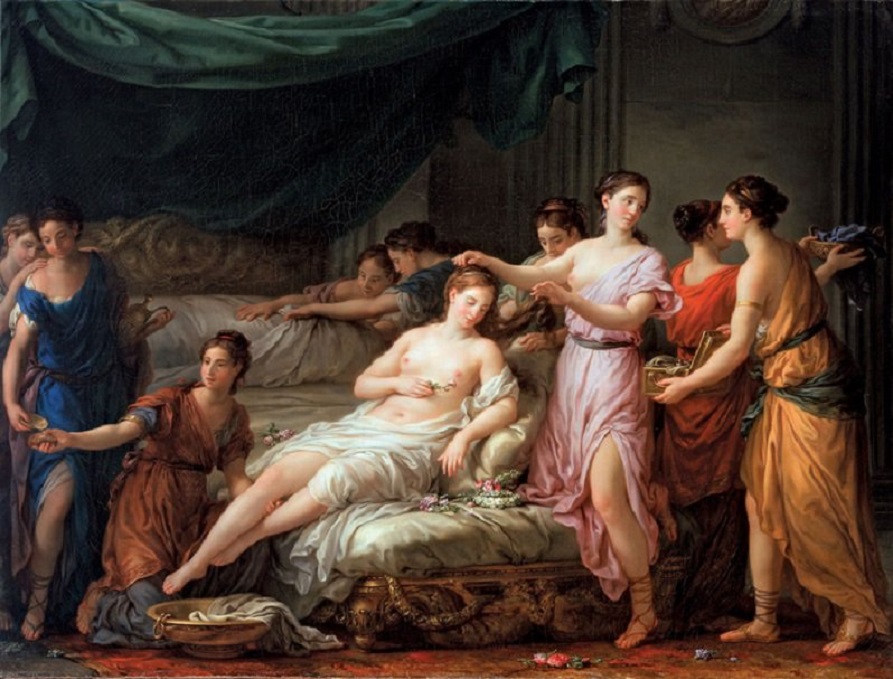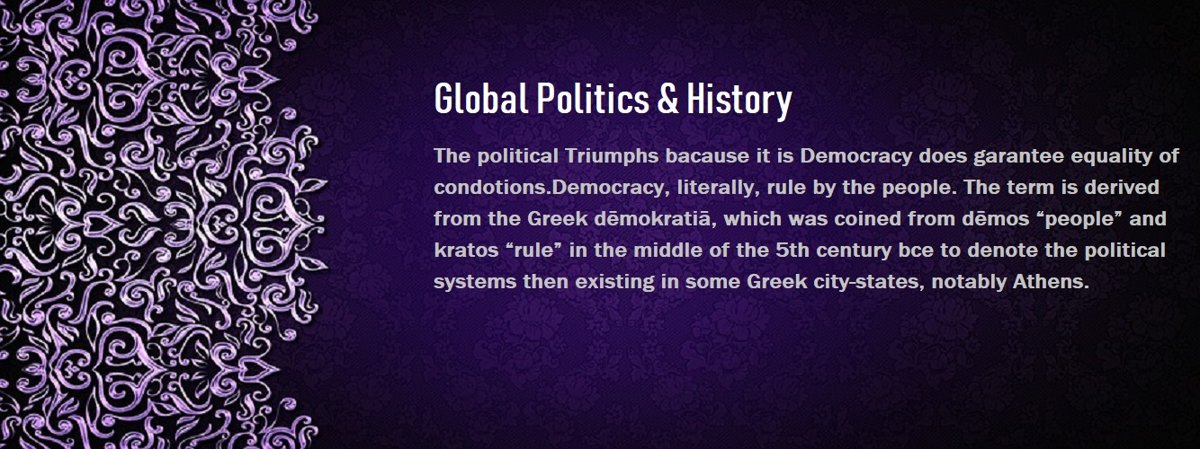EGYPT'S QUEEN CLEOPATRA VII WAS THE DESCENDANT OF GREECE - MACEDONIA WHO WERE ESTABLISHED AS RULERS OVER EGYPT WHEN ALEXANDER THE GREAT CONQUERED EGYPT IN 323 BCE.HER FATHER PTOLEMY XII AULETES ( 51 BCE ,58 -55 BCE) WAS MACEDONIAN KING OF EGYPT.BEFORE CLEOPATRA MET ROMAN EMPEROR JULIUS CAESAR ,SHE MARRIED HER BROTHER - HUSBAND PTOLEMY XIII.
The Greek speaking Ptolemy XII Auletes dinasty (80 - 58 BC, 55 - 51 BC) had ruled Egypt for more than 275 years.Ptolemy was a general who took control of the ancient land Egypt when Alexander the Great conquered Egypt in 323 BCE.The Ptolemy was descended from the Greek Macedonian named Ptolemy Soter, whom Alexander the Great installed in Egypt, so much of Cleopatra's ancestry was Macedonian Greek.Ptolemy XII's daughter Cleopatra VII Thea Philopator was born around in 30 BC.The era began when Alexander's general, Ptolemy, took over as ruler of Egypt, becoming King Ptolemy I Soter of Egypt. Over the next three centuries, his descendants would follow in his path. At its height, Ptolemaic Egypt was one of the world's great powers. Ptolemy made Alexandria, a city founded by Alexander the Great, as his capital. He and his descendants created a dynasty of Macedonian/Greek kings and queens that ruled Egypt for about three centuries. Under the Ptolemaic dynasty Alexandria was a cosmopolitan city that had Greek, Jewish and indigenous Egyptian population with Greek as the lingua franca. In its heyday the city rivaled Athens as the intellectual and cultural capital of the ancient world.Like Alexander the Great, the Macedonian Ptolemaic kings adopted the native Egyptian costume, traditions and observation of religious holidays to gain the native Egyptians’ loyalty. They also followed Egyptian royal practices such as marriage between siblings to confine power within the ruling family. Although the Ptolemies attained a measure of success in dealing with their native Egyptian subjects, rebellion was not uncommon. During the Hellenistic Ptolemaic era a growing power, the Roman, loomed in the horizon and was set to replace the Hellenistic kingdoms as the leading power of the ancient world.Ptolemy II then married his son Ptolemy III, about 9 years old, to his remaining daughter, Cleopatra, who was by time about eighteen.When Ptolemy XII died in 51 BCE, the throne passed to his young son, Ptolemy XIII, and daughter, Cleopatra VII. The 18-year-old Cleopatra, older than her brother , became the dominant ruler. Eventually Cleopatra, forced to flee Egypt, headed toward Syria with the intention of raising an army there. Although there was no history of suicide in her family, there were cases of murder in every direction. Cleopatra is described as fiery and strong-willed, begging the question was to whether she would really have just given up and ended it all. Although it was intended for them to rule as joint monarchs, Cleopatra had no intention of sharing power with her younger sibling. However, there came a time when Ptolemy XIII challenged Cleopatra it was not long after that he was found dead, a similar fate occurred at different times to her other siblings. It is thought that Cleopatra was responsible for two out of five of her sibling’s deaths.
 Roman consul Julius Caesar, who was in a military campaign, and Cleopatra came across each other in Syria. Eventually, they became lovers. Caesar sympathized with her cause and pledged to help her. In 47 BC Caesar launched a campaign in Egypt against Ptolemy XIII and killed him in battle. Caesar then reinstated Cleopatra as the queen.
Roman consul Julius Caesar, who was in a military campaign, and Cleopatra came across each other in Syria. Eventually, they became lovers. Caesar sympathized with her cause and pledged to help her. In 47 BC Caesar launched a campaign in Egypt against Ptolemy XIII and killed him in battle. Caesar then reinstated Cleopatra as the queen.
The Siege of Alexandria was a series of skirmishes and battles occurring between the forces of Julius Caesar, Cleopatra VII, Arsinoe IV, and Ptolemy XIII, between 48 and 47 BC. During this time Caesar was engaged in the civil war between himself and the forces of the Roman Senate.Caesar was horrified at the murder of Pompey, and wept for his one-time ally and son-in-law. He demanded the money Ptolemy's father Ptolemy XII Auletes had been lent by Rome and agreed to settle the dispute between Ptolemy and his sister and co-regent Cleopatra VII. Caesar chose to favor Cleopatra over her brother.Achillas subsequently joined Pothinus in resisting Caesar, and having had the command of the whole army entrusted to him by Pothinus, he marched against Alexandria with 20,000 on foot and 2,000 cavalry.Caesar, who was at Alexandria, did not have sufficient forces to oppose him, and sent ambassadors to negotiate with him. However, Achillas murdered the ambassadors to remove all hopes of reconciliation. He then marched into Alexandria and occupied most of the city. Meanwhile, Arsinoe, the younger sister of Ptolemy, escaped from Caesar and joined Achillas. In 47 BC, dissension broke out between them, and Arsinoe had Achillas put to death by Ganymedes, a eunuch to whom she then entrusted the command of the forces.Ganymedes initially enjoyed some success against Caesar, who had only the soldiers he had brought with him and a minor Italian militia left over from previous issues in 55 BC, but the leading Egyptian officers were soon dissatisfied with the eunuch. Under a pretext of wanting peace, they negotiated with Caesar to exchange Arsinoë for Ptolemy XIII, who was subsequently released only to continue the war. Relief for the Romans came from Mithridates of Pergamum and Antipater from Judea. A final pitched battle was fought on the west side of the Nile River with Caesar victorious and Ptolemy drowning while attempting to cross the river.Romance of Cleopatra and Roman Julius Caesar.Cleopatra was a famous queen of ancient Egypt. She was beautiful, intelligent and self-confident.Her courage or her charisma which charmed Caesar from this point they became lovers with two Roman rulers, Julius Caesar and Mark Antony. Plutarch records that before Julius Caesar had even landed in Egypt Theodotus, the tutor of Ptolemy XIII, sailed out to meet him with the severed head of Pompey. This was intended to curry favour with Caesar and encourage him to set sail for Rome immediately with his business in Egypt being finished, but it had the opposite effect.Either way it hardened his feelings against Ptolemy XIII.Cleopatra, according to the stories, had herself delivered to Julius Caesar's presence in a rug and won his support. Ptolemy XIII died in a battle with Caesar.In 44 BC Julius Caesar was assassinated. The vacancy in leadership and power had to be filled up with the three of the most powerful personalities in the Roman world namely Mark Antony (83 BC-30 BC), Gaius Octavius or Octavian (67 BC-14 AD) and Marcus Aemilius Lepidus (89 BC-12 BC); thus, the second triumvirate emerged. Mark Antony used the assassination of Caesar to turn the Romans against the conspirators which gave him a time for power in Rome. His greatest rival was Octavian, the grand nephew of Caesar and his designated heir. In 42 BC the triumvirate crushed the forces led by two assassins of Caesar, the Roman statesman Marcus Junius Brutus and Gaius Cassius Longinus, who sought the restoration of the Roman republic. After defeating the assassins of Caesar, the triumvirate met in Italy in 40 BC to arrange for the division of the Roman territories that they would control and govern and to avoid conflict with each other. Antony was given the Eastern portion which extended from the Adriatic Sea to the Euphrates River.In the midst of the turmoil in Rome Cleopatra returned to Egypt with her child Caesarion. She did not involve herself in the war to help the triumvirate.
 In 44 BC Julius Caesar was assassinated.Cleopatra received several letters from Mark Antony and from his friends, to summon her. Cleopatra sailed from Egypt to the city of Tarsus. As she made the final leg of her journey up the river Cydnus she traveled in a magnificent barge filled with flowers and scented with exotic perfumes while she reclined on deck surrounded by her servants and trappings of gold. Antony enjoyed and once he saw her, he fell under her spell.
In 44 BC Julius Caesar was assassinated.Cleopatra received several letters from Mark Antony and from his friends, to summon her. Cleopatra sailed from Egypt to the city of Tarsus. As she made the final leg of her journey up the river Cydnus she traveled in a magnificent barge filled with flowers and scented with exotic perfumes while she reclined on deck surrounded by her servants and trappings of gold. Antony enjoyed and once he saw her, he fell under her spell.
 The relationship of Antony and Cleopatra is a true test of love. They fell in love at first sight. The relationship between these two powerful people put the country of Egypt in a powerful position. On her arrival, Antony sent to invite her to supper. She thought it fitter he should come to her; so, willing to show his good humor and courtesy, he complied, and went. He found the preparations to receive him magnificent beyond expression, but nothing so admirable as the great number of lights; for on a sudden there was let down altogether so great a number of branches with lights in them so ingeniously disposed, some in squares, and some in circles, that the whole thing was a spectacle that has seldom been equaled for beauty.
The relationship of Antony and Cleopatra is a true test of love. They fell in love at first sight. The relationship between these two powerful people put the country of Egypt in a powerful position. On her arrival, Antony sent to invite her to supper. She thought it fitter he should come to her; so, willing to show his good humor and courtesy, he complied, and went. He found the preparations to receive him magnificent beyond expression, but nothing so admirable as the great number of lights; for on a sudden there was let down altogether so great a number of branches with lights in them so ingeniously disposed, some in squares, and some in circles, that the whole thing was a spectacle that has seldom been equaled for beauty.
Mark Antony who now controlled the Eastern part of the Roman territories summoned Cleopatra to Tarsus in Cilicia to explain her conduct during the civil war. However, in their meeting Mark Antony was captivated with her charm and beauty so that he felt in love with her. And they become lovers. His love absolved her of the shortcomings that she had made. He later accompanied her in her return to Egypt.To secure his position in the east, Mark Antony must have goodwill with his strongest rival in the triumvirate, Octavian, the heir designate of Julius Caesar. Lepidus, the other triumvir was the weakest and the most submissive. To cement his political relation with Octavian, Mark Antony married the latter’s sister Octavia. After his marriage Mark Antony returned to Egypt to continue his life with Cleopatra. Knowing his weaknesses for luxury and indulgence, it was not long before Antony too was in her clutches. The Romans citizens, and Octavius in particular, were very displeased an Antony's neglect of his responsibilities and eventually sought to take away his command. The battle of Actium followed, but instead of fighting to the end, Antony and Cleopatra sailed back to Egypt while the battle was still raging. Similarly, Cleopatra can be described as being ‘consistently inconsistent’ much like the settings, which are dispersed and erratic, with the play taking place in various locations across the Roman Empire. Cleopatra’s keeping Antony guessing by remaining unfixed, in order to hold onto not only his affections but also her own political power and sovereignty in Egypt, as with her previous lover, Julius Caesar, is in part a power ploy. Their interaction as embodiments of Rome and Egypt can thus be considered as an interaction between Rome and Egypt themselves. The characters are therefore ruled on two levels: that of natural passions coming from Egyptian life and reason and order. Antony was a supporter of Julius Caesar, and served as one of his generals during the conquest of Gaul and the Civil War. Antony was appointed administrator of Italy while Caesar eliminated political opponents in Greece, North Africa, and Spain. Mark Antony felt very much attracted to Cleopatra and the Egyptian queen helped him in his battle against Octavian. Octavian went to war against Antony, who unitedhis navy with Cleopatra's. After they had been defeated at the Battle of Actium in 31 B.C. the couple fled to Alexandria.Antony hoped to oust Octavian and rule both Rome and Egypt with Cleopatra, but Octavian used their relationship to his advantage. Octavian told the Roman people that Cleopatra cast a spell on Antony and argued that Antony was willing to give away the Roman world to a foreign woman. Octavian declared war on Cleopatra, forcing Marc Antony to choose between Cleopatra and Rome. Antony chose Cleopatra.Octavian’s forces defeated Antony and Cleopatra’s ships in the Battle of Actium on the Mediterranean Sea in 31BCE. Antony and Cleopatra managed to escape the encounter, but Marc Antony committed suicide as Octavian’s army approached. When Cleopatra learned of Antony’s death, she realized that Octavian’s army would kill her. The Egyptian queen chose to end her life on her own terms.According to historical accounts, after losing the Battle of Actium to Octavian's forces, Cleopatra committed suicide.Octavian then made Egypt a Roman province and became its first emperor, changing his name to Augustus.
 The battle line was drawn. Octavian’s forces were pitted against those of Mark Antony and the Egyptian queen Cleopatra. They finally met in 31 BC in Actium. Mark Antony fared badly against the forces of Octavian in the naval battle. Cleopatra, realizing the futility of further engagement withdrew her Egyptian fleet. Mark Antony followed her, and they fled to Alexandria.When Cleopatra learned about Antony 's death, she was shocked. And she took her own life. Great love demands great sacrifices.
The battle line was drawn. Octavian’s forces were pitted against those of Mark Antony and the Egyptian queen Cleopatra. They finally met in 31 BC in Actium. Mark Antony fared badly against the forces of Octavian in the naval battle. Cleopatra, realizing the futility of further engagement withdrew her Egyptian fleet. Mark Antony followed her, and they fled to Alexandria.When Cleopatra learned about Antony 's death, she was shocked. And she took her own life. Great love demands great sacrifices.
 Cleopatra committed suicide by allowing an asp (Egyptian cobra) to bite her. In other versions offered by Roman historians, Cleopatra poisoned herself using either an implement or toxic ointment. Primary source accounts are derived mainly from the works of the ancient Roman historians Strabo, Plutarch, and Cassius Dio. Some modern scholars speculate that she was murdered, while others doubt the validity of the accounts involving snakebites as the cause of death. Some academics hypothesize that her Roman rival Octavian, out of political expediency, allowed Cleopatra to commit suicide in the manner of her choosing.
Cleopatra committed suicide by allowing an asp (Egyptian cobra) to bite her. In other versions offered by Roman historians, Cleopatra poisoned herself using either an implement or toxic ointment. Primary source accounts are derived mainly from the works of the ancient Roman historians Strabo, Plutarch, and Cassius Dio. Some modern scholars speculate that she was murdered, while others doubt the validity of the accounts involving snakebites as the cause of death. Some academics hypothesize that her Roman rival Octavian, out of political expediency, allowed Cleopatra to commit suicide in the manner of her choosing.

